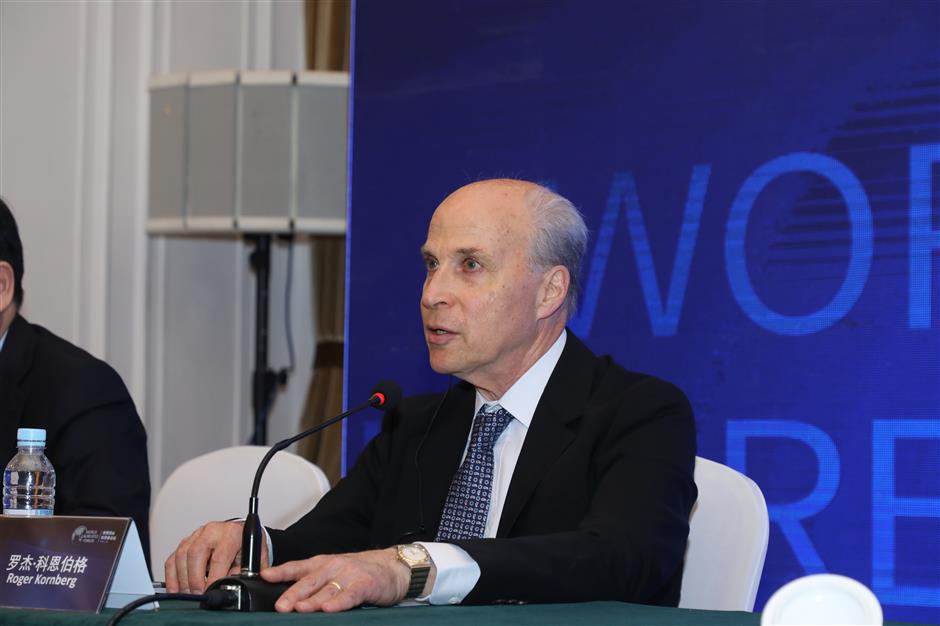World's greatest scientists and Nobel minds to gather in Shanghai

Roger Kornberg, President of the World Laureates Association and 2006 Chemistry Nobel Laureate, at a news briefing for the 2019 World Laureates Forum on Saturday
The 2019 World Laureates Forum will be held in Pudong's Lingang Special Area of Shanghai's Free Trade Zone between October 29 and 31 with nearly 70 world top science award winners and 100 other scientists and entrepreneurs in science and technology from home and abroad.
The theme will be "technology for the common destiny of mankind."
The 67 world science award winners include 45 Nobel Laureates, including 2007 Economics laureate Eric Maskin, and Frank Wilczek, who won the 2007 Nobel in physics, as well as 26 winners of prizes like the Wolf Prize in agriculture, sciences and the arts, the Lasker Prize for disease prevention, the Turing computer science award, the MacArthur Fellowship for everything from the arts to science, and the Fields Medal for world-class mathematicians under 40.
This year's World Laureates Forum will be almost triple that of last year, with more diverse groups to participate in, which means a wider social influence.
It will feature three special sub-forums: the Mobius Forum, the International Grand Science Project Strategic Talk and the Young Scientist Forum.
"The Mobius Forum will have the scientists think about the future of science, explore the forefront of technological invention and build a special all-science conference," said Chen Jie, deputy secretary and full-time deputy director of the Party Committee of the Lingang Special Area, which recently joined the Shanghai Free Trade Zone.
"The International Grand Science Project' Strategic Talk will focus on projects which can solve major global issues and the Young Scientist Forum will look at the growth of future scientists.
"It will cooperate with professional societies, universities, research institutes, innovative enterprises and other related organizations to hold summits on various fields.
These will include artificial intelligence, 5G, integrated circuits, genetics and precision medicine, innovative drug development and translational medicine, cancer and tumor treatment, medical imaging technology, brain science and cognition, carbon-hydrogen bonds and organic chemistry, new energy and sustainable development, and scientific and technological finance.
This year, it pays special attention to supporting global young scientists and their new findings and ideas on the shared future for mankind, which will promote the development of human science.
The forum will select 100 young scientists from nearly 50 universities worldwide and build a world-level science and technology communication platform, encouraging more young people to take up science.
"The future is the need for the discovery of new knowledge. We can keep applying what we know already, but much of the technology that can be developed from existing knowledge has already been done," Roger Kornberg, President of the World Laureates Association and 2006 Nobel Laureate in Chemistry, told Shanghai Daily.
"Still, most problems remain, most diseases cannot be cured. The planet has been plundered by my generation and your generation will suffer. These great problems will only been solved by information that is not yet available. Discoveries will be made and will lead the cure of all diseases. I hope discoveries will be made soon enough to save the planet."
He said this year organizers settled on two objectives for the forum: support basic research to discover new knowledge and support young investigators — who will make the discoveries of the future.















